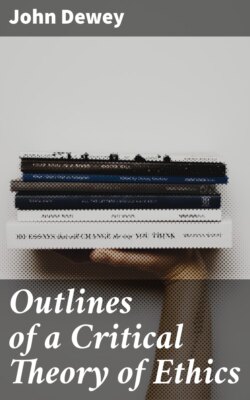Читать книгу Outlines of a Critical Theory of Ethics - Джон Дьюи - Страница 9
На сайте Литреса книга снята с продажи.
V.
ОглавлениеThe Motive in Conduct.
Before taking up the first problem presented, the nature of the good or the end of conduct, it is necessary to analyze somewhat further the various sides and factors of conduct in order to see where the distinctly ethical element is to be found. The elements particularly deserving consideration are (1) the Motive; (2) the Feelings or Sentiments; (3) Consequences of the Act; (4) Character of Agent. We shall begin with
1. The Motive. The motive of the act is the end aimed at by the agent in performing the act. Thus the motive of Julius Cæsar in crossing the Rubicon was the whole series of results which he intended to reach by that act of his. The motive of a person in coming to college is to gain knowledge, to prepare himself for a certain profession. The motive is thus identical with the ideal element of the action, the purpose in view.
2. The Feelings or Disposition. Some writers speak of the feelings under which the agent acts as his motive. Thus we may suppose Julius Cæsar 'moved' by the feelings of ambition, of revenge, etc., in crossing the Rubicon. The student may be 'moved' by curiosity, by vainglory, by emulation, by conscience, in coming to college. It is better, however, to regard the motive as the reason for which the act is performed, and to use the term moving or impelling cause for the feelings in their relation to action. Thus we may imagine a parent asking a child why he struck a playmate, meaning what was the motive of the action. If the child should reply that he struck his playmate because he was angry, this answer would give the moving cause or impelling force of the action, but not its motive. The motive would be the idea of punishing this playmate, of getting even with him, of taking something away from him. The motive is the end which he desired to reach by striking and on account of which he struck. This is implied by the fact that the parent would ask, "What made you angry?"
